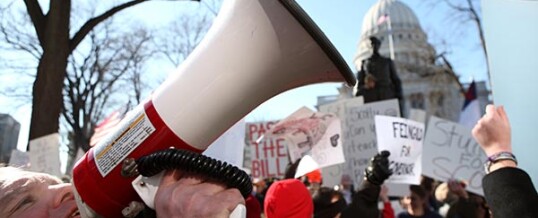
The failure of the vote to recall Wisconsin Republican Governor Scott Walker sends two distinct messages: the majority of voters want their elected officials to maintain a government living within its means; and that unions can no longer dictate how a government operates.
Now that Walker has become the only sitting governor to defeat a recall vote, many are counting on him to carry Wisconsin this November for Mitt Romney. This would be the first time Wisconsin voted for a Republican presidential candidate since Ronald Reagan in 1984.
But it is bigger than this. The Democrat “blue wall” of rust belt states including Michigan, Pennsylvania and Wisconsin has been ruptured. White working class voters are leaving Obama in droves including many union households.
That’s bad news for Democrats, and especially for unions.
Unions have failed in two major election initiatives in Wisconsin within one year. They failed to defeat Walker, and lost a fight to unseat a State Supreme Court justice.
They also failed on the national level to get through Congress their beloved “Card Check” which would do away with the secret ballot and dramatically shorten the time for unionization votes to take place.
Unions are on the ropes.
If you’re like most people, you have to be wondering how unions continue to throw their clout around when today they represent less than eight percent of the work force. Union membership in the U.S. was at its height during the late 50s when nearly sixty percent of the American workforce was unionized.
There is a reason for the decline of unions: their leadership has become stale, self-serving and out of touch.
If you want further proof, a story this week noted that the president of the American Federation of State, County and Municipal Employees (Afscme), flew a charted jet 18 times since 2010. Do we really want unions dictating how we spend our money?
The handwriting is on the wall. It is becoming less and less advantageous to belong to a union. According to information obtained by The Wall Street Journal, membership in Afscme has dropped 4.2 percent to 1.32 million between March 2011 and February 2012.
In Wisconsin, Afscme membership has dropped 45 percent after Governor Walker made union membership optional.
The 1935 Wagner Act helped change the balance of power between labor and management, when workers were given the right to organize and join unions and the right to bargain collectively. It defined unfair labor practices by management and created a National Labor Relations Board (NLRB) to enforce provisions of the law. The NLRB could conduct elections in a factory or other workplace to determine whether workers wanted to be represented by a particular union.
This process has been subjugated by unions and exploited, to force workers to join unions or face retribution.
Union leaders have been able to force local public workers to have their dues automatically deducted from their paychecks.
On average, a teacher in Wisconsin, for example, pays more than $1,000 per year to the union (from an average salary of $51,264). A great portion of this money goes toward political activities, including paying for ad campaigns and TV time supporting Democrat politicians for which they do not favor.
During the recall vote in Wisconsin, information indicates that the Democratic Governors Association and the Democratic National Committee paid about $14 million (according to the government watchdog group the Wisconsin Democracy Campaign). This was supported by union funds.
It defies common sense and the American sense of fair play that any employee — and especially a public employee — would be forced to join a union and have their dues directly deducted by the state from their payroll.
All of that, only to see their money handed over by the state to a union they don’t support, and which will send it back to Democrat political campaigns.
Should unions be running scared? You bet.
If you really want to understand the drop in union’s clout, President Barack Obama, who received millions in campaign donations from unions in 2008, said barely a peep about the recall election. Even he recognizes that siding with the unions in their naked power grabs is risky business.
America needs jobs. But we can’t create jobs if union wages and benefits are depleting the resources of America’s companies. Look at GM. They got in trouble trying to meet the wage and benefit demands of unions. So when the Obama administration dug them out of their financial hole with huge taxpayer handouts, the money went back to the unions. That’s no way to run a profitable company.
Wisconsin and Indiana have passed right to work laws, which require that employees be allowed to work without joining a union or paying dues or fees. Similar legislation is being considered in Missouri, Ohio and Pennsylvania. This movement will only grow.
When companies can compete on a level playing field and offer a fair wage for a fair day’s work, more Americans can get back to work. More companies will be willing to hire. More workers will want to get back into the workforce and our younger workers will finally see job opportunities at the end of a long, dark tunnel.
We still have a long way to go toward seeing a healthy economy and a positive job picture, and it isn’t all about unions. But the vote in Wisconsin is one sign that unions are on their way out and sanity is being restored to the way a responsible government must operate.
JUN



